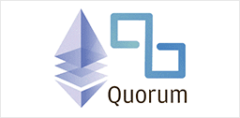
BLOCKCHAIN IN FINANCE
Project Khokha: Blockchain Case Study for Central Banking in South Africa
Increasing transaction volume and network resilience while maintaining confidentiality requirements for real-time gross settlement on Enterprise Ethereum.
Pushing the limits of interbank payment settlement with blockchain
For the banking industry, the cost of providing the utmost reliability, availability, and resilience against attacks or equipment failure is high. Reconciliation payments continue to be inefficient and the burden of reporting suspicious transactions falls on banks.The South African Reserve Bank (SARB), in consortium with seven commercial banks, used Quorum, an enterprise-grade implementation of Ethereum, to create a blockchain-based interbank system that processed the typical daily volume of payments with full confidentiality and finality in record time.
The Challenge
Central banks need an innovative way to increase the resiliency of interbank payment systems while maintaining or reducing the overall cost of those systems. SARB created a simulation to assess if the performance, scale, and confidentiality of payments were possible utilizing blockchain technology.
The Enterprise Ethereum Solution
In consortium with seven commercial banks, SARB partnered with Consensys Solutions and Adhara, to build a proof-of-concept grounded in real-world performance, confidentiality requirements, and diverse bank hardware on the blockchain—without a single point of failure. By harnessing a permissioned blockchain network, the Istanbul Byzantine Fault Tolerance consensus mechanism, Pedersen commitments, and range proofs, Project Khoka was able to replicate interbank clearing and settlements in less than two hours.
Goals Achieved
1. Exceeded the transaction performance target at 70,000 transactions in less than two hours.
2. 95% of block propagation time in less than 1 second and 99% propagation in less than 2 seconds. This demonstrated that acceptable performance is achievable, despite the geographical distribution of the banks’ hardware.
3. Achieved privacy while meeting required transaction volumes.
4. This was the first time that the IBFT consensus mechanism, Pedersen commitments, and range proofs for confidentiality were used together with Quorum. Combined, all key elements delivered a combination of scalability, resilience, confidentiality, and settlement finality.
Project Khokha was recognized by the Central Bank Publication as the “Best Distributed Ledger Initiative” of 2018.

“Our goal with Project Khokha is to contribute to the global initiatives which assess the application and use cases of distributed ledger technology (DLT) through this collaborative effort piloted by the South African Reserve Bank (SARB) together with the national banking community.”
— Francois Groepe, Deputy Governor, South African Reserve Bank
